- Home
- Neil Gaiman
Don't Panic Page 15
Don't Panic Read online
Page 15
The complimentary towels were intended to cause the writers who received them to recommend them in print, something which happened almost without exception.
The towels were originally available in a sort of purple and a sort of blue. They were large, strong, good value, and did all the things that hitchhikery towels are well known for doing, in addition to which they gave you something to read on long journeys, something that even Douglas Adams, in his initial treatise on towels, failed to think of. The second edition of towels were available in ‘Squornshellous Silver’ and ‘Beeblebrox Brown’, and were sixty inches by forty inches.*
* A British chain store whose underwear can be found on two out of three British people.
* A wide variety of merchandise, such as T-shirts, pens, badges, stickers, etc, is available from ZZ9 Plural Z Alpha (4-The Sycamores, Hadfield, Glossop, Derbyshire SK13 2BS, UK). Though the ‘official’ Hitchhiker’s towel is no longer available, ZZ9 Plural Z Alpha still sell a very nice ‘Don’t Panic’ towel. They would like to sell even more of them so that they can have their spare bedroom back.
21
GAMES WITH COMPUTERS
Douglas Adams was always fascinated by gadgets of every kind. His home, and indeed his life, was awash with all those little devices designed to reduce the complications of the workaday world. Televisions and amplifiers, computers and cameras, tape players of all descriptions, electronic objects of every colour and size. “The tendency for me to take the piss out of technology is me taking the piss out of myself. Digital watches and a kitchen full of juice extractors—I’m a sucker for it!”
While the initial success of Hitchhiker’s allowed him to indulge his passion for tape players, Walkmans and the like, he remained for a long time on a battered manual typewriter, neither liking nor trusting computers.
DEEP THOUGHT DESIGN:
THE COMPUTER IS BASICALLY A TALL WHITE TOWER WHICH TAPERS AS IT GOES UP. AS IT GOES DOWN IT WIDENS OUT SO THAT IT ACTUALLY BECOMES THE FLOOR. YOU QUITE LITERALLY WALK UP TO IT. TO EITHER SIDE OF IT AND SET SLIGHTLY FORWARD OF IT ARE TWO SIMILAR BUT SMALLER TOWERS. SET INTO THE FRONT OF EACH TOWER IS A TV SCREEN. THE SCREEN ON THE MAIN TOWER HAS A PICTURE OF A MOUTH. WHEN DEEP THOUGHT TALKS, THE MOUTH MOVES IN SYNCH. ONE OF THE OTHER SCREENS SHOWS A SINGLE EYE, AND THE THIRD SCREEN SHOWS A SIDE VIEW OF A SINGLE EAR. EACH EYE AND EAR AND MOUTH SHOULD BE AS ANONYMOUS AS POSSIBLE, BUT IT SHOULD BE APPARENT THAT THEY ARE NOT FROM THE SAME PERSON.
— Deep Thought design (first version) from TV series script, Episode Four.
In a 1982 interview he revealed that he considered computers to be, if not intrinsically malevolent, then useless—either HACTARs or EDDIEs. He had just moved into the Islington flat, and had found it impossible to convince the various utilities companies’ computers that he had in fact moved. “Dealing with the American Express computer”, he told the reporter, “has been beyond Kafka’s worst nightmares”.
In retaliation he had created a scenario for Life, the Universe and Everything in which a world much like our own is poised on the brink of nuclear Armageddon, and tipped over the brink not by a flock of geese or a madman’s finger on a red button, but by a change-of-address card fouling up a computer. The scene never made it into the final draft.
He had tried to like computers, indeed had gone to a computer show earlier that year, but had been overcome by jargon and was forced to leave. His enthusiasm (bordering on messianic fervour) for computers did not really begin until 1983, when he spent seven months in Los Angeles, supposedly writing the Hitchhiker’s Guide to the Galaxy film screenplay.
While it is true that he did write one and a half drafts of a screenplay over this time, it would be equally fair to say that he spent much of the time playing with his word processor and getting involved with interminable computer games.
Douglas had received many requests to turn The Hitchhiker’s Guide to the Galaxy into a computer game, and had so far refused all of them. However, the time spent playing computer games had given him definite ideas: he knew he wanted the Hitchhiker’s game to be far more a problem-solving, interactive novel than an arcade or space invaders game.
In late 1983 he contacted Infocom, a Massachusetts based company whose previous games had impressed him, and suggested a collaboration. They agreed enthusiastically, and by January 1984 Douglas was in a position to announce, “I’m going to get the computer game done this year which will give me an excuse for playing around with my computer. I’ll be doing the work on a computer in Boston and accessing it from here on international packet-switching. I love all that!”
NEW DEEP THOUGHT DESIGN:
DEEP THOUGHT IS A HUGE EDIFICE, AS HUGE AS SET AND BUDGET LIMITATIONS WILL ALLOW. IT IS BRILLIANT GOLD. IT IS CLEARLY A COMPUTER, BUT IT BEARS AN UNCANNY RESEMBLANCE TO A HUGE FAT BUDDHA. THE FACT THAT IT DOES SO MUST LOOK AWESOME AND IMPRESSIVE.
— Deep Thought design (second version) from TV series script, Episode Four.
Douglas Adams’s collaborator on the computer game was an American, Steve Meretzky. They began by corresponding via electronic bulletin board, and then met in February 1984 for initial discussions. Adams wrote chunks of material, sent them via computer to Meretzky, who programmed them and sent them back. Douglas Adams actually designed and wrote more than half the game; the rest was a joint effort, using Douglas’s ideas and material, and Meretzky’s computer experience. The game itself was released in late ‘84, and proved an immediate success. The packaging was imaginative, containing an illustrated booklet with pictures of the Guide and sundry alien phenomena, together with a ‘Don’t Panic’ badge, Joo Janta sunglasses, fluff, a microscopic space fleet, demolition orders (real eager-beavers should take a very careful look at the signatures on them), and no tea.
The computer game, which Adams described as “bearing as much relationship to the books as Rosencrantz and Guildenstern are Dead does to Hamlet”, opens much as the other versions of Hitchhiker’s. You are Arthur Dent, waking with a hangover on the morning that your house is demolished, but you rapidly find yourself in a fiendish and phantasmagoric nightmare, in which the object seems to be as much to find out what the purpose of the game is as it is to play it.
As Adams explained, “It gets the player going and lulled into a false sense of security. And then all hell breaks loose and it goes through the most extraordinary number of directions. The game just glances at events which were a major part of the books, while things I used as one line throwaways are those that I used for the game’s set pieces. The reason was to keep me interested in doing it, and I wanted to make it fair for the people who haven’t read the books. So readers and non-readers were, as much as possible, on an equal footing… the game is equally difficult for both.”
The response to the game was extraordinary. Described by the London Times as “without doubt the best adventure ever seen on computer”, it became the bestselling adventure game in America on its release, selling over a quarter of a million copies. A major part of the game’s success must have been due to the fact that a real-life author was, for the first time, actively involving himself in, indeed writing, a computer game based on his work; and also to Adams’s own love of messing around with computers, and devising problems, doing crosswords and the like—not to mention his need to keep himself interested and amused by that game, which communicates itself to participants.
The game contains much that is new (and doubtless apocryphal); obscure, brain-baffling problems; and much new Adams text, including another opportunity to examine and rewrite the events of the first half of the first book. Doors, Babel fish, peanuts and tea (or lack therefore) take on a whole new lease of life.
Some sample passages include:
Of a pub cheese sandwich…
The barman gives you a cheese sandwich. The bread is like the stuff that stereos come packed in, the cheese would be great for rubbing out spelling mistakes, and margarine and pickle have combined to produce something that shouldn’t be, but is, turquoise. Since it is clear
ly unfit for human consumption you are grateful to be charged only a pound for it.
Of one of the many deaths of Arthur Dent…
Your serious allergic reaction to protein loss from matter transference beams becomes a cause célèbre among various holistic pressure groups in the Galaxy and leads to a total ban on dematerialisation. Within fifty years, space travel is replaced by a keen interest in old furniture restoration and market gardening. In this new, quieter Galaxy, the art of telepathy flourishes as never before, creating a new universal harmony which brings all life together, converts all matter into thought and brings about the rebirth of the entire Universe on a higher and better plane of existence. However, none of this affects you, because you are dead.
Later in the game, when one obtains a copy of the Guide, it can be consulted on a number of subjects. Fluff, for example…
Fluff is interesting stuff: a deadly poison on Bodega Minor, the diet staple of Frazelon V, the unit of currency on the moons of the Blurfoid System, and the major crop of the laundry supplies planet, Blastus 111. One ancient legend claims that four pieces of fluff lie scattered around the Galaxy: each forming one quarter of the seedling of a tree with amazing properties, the sole survivor of the tropical planet Fuzzbol (Footnote 8). The ultimate source of fluff is still a mystery, with the scientific community divided between the Big Lint Bang theory and the White Lint Hole theory.
(Footnote 8, should you care to check, informs you that “it’s not much of a legend really”.)
The game is bizarre and improbable. It has the text of a short novel in its memory, and meant that a good part of Douglas Adams’s mail subsequently consisted of heartfelt cries from people trapped on the bridge of the Heart of Gold or unable to obtain a Babel fish.
A second game was planned at the same time as the first, this to take place on the planet of Magrathea.
Whether or not the game is a valid part of the Hitchhiker’s canon (for which the only requisite for joining would seem to be that it is completely different from any other versions) could be debated. But comparison is not really needed. As Douglas Adams explained, when interviewed about Interactive Literature, “You can’t compare IL with literature. If you do, you can very easily make a fool of yourself. When Leo Fender first invented an electric guitar one could have said: ‘But to what extent is this real music?’ To which the answer is: ‘All right, we’re not going to play Beethoven on it, but at least let’s see what we can do.’ What matters is whether it’s interesting and exciting.
“The thing I like about this is that I can sit down and know that I am the first person to be working in this specific field. When you are writing a novel, you are aware that you are manipulating your readers. Here you know you are going to have to make them think how you want them to reason. I don’t regard it as being an abdication of creative art. Yes, at first I was horrified: in fact, there is a sense in which now the author is even more in control, because the ‘reader’ has more problems to solve. All the devices of the novel are still at your disposal, because a novel is simply a string of words, and words can mean whatever you want them to. It just offers the opportunity to have a lot of fun”.
Adams enjoyed putting together and writing the computer game more than any other aspect of Hitchhiker’s. Following the computer game, Adams’s interest in computers, computer games and programming remained high, although at one point he found that he was spending so much time playing with his Apple Macintosh that he switched back to a manual typewriter, in order to get some work done and as a form of penance. Subsequent computer-related projects included Bureaucracy*, Starship Titanic and h2g2.com. Projects that were slated to happen but never did include Reagan, God, Hitchhiker’s II and The Muppet Institute of Technology.
The Muppet Institute of Technology was to have been a one-hour special for television, using the Muppets to promote the idea of computer literacy. The late Jim Henson, the Muppets’ creator, flew Adams and twenty other people to New York for discussions, and while Douglas was enthused about the project, and found Henson Associates “extraordinarily nice people to work with”, the project did not happen.
The idea for the Reagan program occurred to Douglas after watching one of the Reagan-Mondale debates in 1984: “It occurred to me that people who have to brief Reagan for a debate such as that have to provide him with the minimum number of facts and the maximum number of ways of getting to those facts, and the most all-embracing fallback positions—lines to come up with when he doesn’t really know the answer to the question and maybe doesn’t even understand the question, but has recognised some key phrase, and can come up with a phrase or line that will cover it.
“And I thought, ‘This is exactly the way you program a computer to appear to be taking part in a conversation.’ So, with a friend in New York, I was going to do a program to emulate Reagan, so you could sit down and talk to a computer and it would respond as Reagan would. And then we could do a Thatcher one, and after a while you could do all the world leaders, and get all the various modules to talk to each other.
“After that we were going to do a program called God, and program all God’s attributes into it, and you’d have all the different denominations of God on it… you know, a Methodist God, a Jewish God, and so on… I wanted to be the first person to have computer software burned in the Bible Belt, which I felt was a rite of passage that any young medium had to pass through.
“However, with the recession in the American computer industry, all that came to nothing, largely because the people who wanted to do it with me discovered they didn’t have cars or money or jobs.”
THE GAME ITSELF
It is difficult to say too much about the computer game without giving information away that could spoil it for somebody playing it. Essentially, it is based on the events in the first two-thirds of the book The Hitchhiker’s Guide to the Galaxy. One starts out as Arthur Dent, in bed one morning in Tiverton in Devon, with an awful hangover. Initial problems include how to pick something up without it slipping through your fingers and how not to be killed when a large yellow bulldozer knocks down your house.
Things remain fairly faithful to the book until you reach the Heart of Gold, at which point Ford, Zaphod and Trillian go off to have a sauna and you are left to your own devices in a ship full of uncooperative GPP machines. After that things get very bizarre indeed: events are experienced from a multitude of viewpoints; problems to be solved occur in places as disparate as Damogran, a party in Islington, and the interior of a whale.
To get you through the game are your copy of The Hitchhiker’s Guide, your Sub-Etha Sens-O-Matic and Electronic Thumb, and your towel—not to mention your native wit, luck, and a sense of humour. And a thing your aunt gave you that you don’t know what it is.
The game is addictive: fiendishly hard, yet impossible to leave alone until every last problem is solved, which can only be done by paying attention to every piece of information that comes your way, and often by thinking extremely laterally. The game can be played by novices, who might in some ways have less difficulty than experienced computer gamers, who would not necessarily find it easy to tune in to the game’s peculiar mind-set.
The weakest part of the game is the opening section of the packaging and manual: an eight-page advertisement for the Guide (“Yes! The Universe Can Be Yours For Less Than 30 Altairian Dollars Per Day!”) which comes across as sophomoric—more like Mad magazine than Douglas Adams.
The game, however, is a major achievement, one that even the least computer literate Hitchhiker’s fan should enjoy.
It is easy to see why Douglas Adams found this the most enjoyable part of Hitchhiker’s; almost all aspects of it, from the adventure, to the Guide entries, to the footnotes, even to the Invisiclues Hints book, display a relaxed attitude missing from the books and radio series. Adams had a tendency to have ideas that didn’t always fit into the framework of what he was doing at the time. The enjoyable thing about the computer game is that the most bizarre ideas co
uld be incorporated into it with ease. Also Adams’s love of problem-solving (crosswords and such) was given full rein.
Postscript: The Hitchhiker’s computer game was subsequently re-released on a CD-ROM called The Lost Treasures of Infocom and was eventually made available over the web as part of the Comic Relief site.
* The object of Bureaucracy being to persuade your bank to acknowledge a change-of-address card.
22
LETTERS TO DOUGLAS ADAMS
“I’m terribly grateful for the fans—apart from anything else, they provide my bread and butter. I’m obviously delighted there are so many people who enjoy this stuff. But I try to keep a little bit of distance because I believe the most dangerous thing a person can do is believe their own publicity. I know, from people I look up to and admire—for instance, John Cleese: it took me a long time to be able to perceive him as an ordinary human being, and I know how very very easy it is to look at somebody who is actually a perfectly normal human being, who happens to have a particular talent, an ability or facility that puts them into the limelight, to see them as being some sort of very elevated and extraordinary person, which they’re not. I think you do yourself a favour if you try not to expose yourself too much to people who are going to tell you you are God’s gift to the human race, which you’re not. The media present you as being some kind of superhuman, and you aren’t, so you just have to keep all that at arm’s length.
“It’s rather curious when I discover that a phrase of mine has entered the language. I mean, one never seriously thinks that what one gets up to at home has much effect on anything else, and though you see the bestseller lists, and get letters and royalty statements it doesn’t impinge on me that it has that kind of effect on other people. I don’t want to believe that it does.

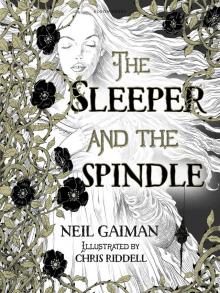 The Sleeper and the Spindle
The Sleeper and the Spindle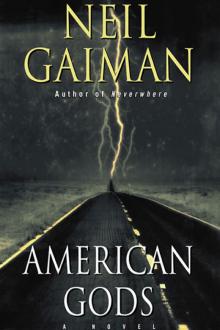 American Gods
American Gods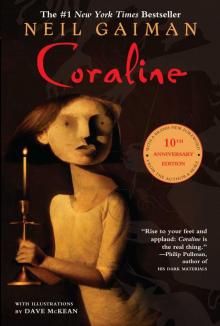 Coraline
Coraline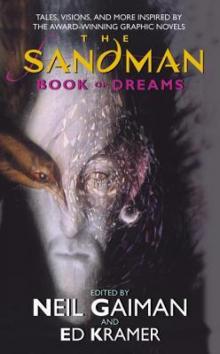 The Sandman: Book of Dreams
The Sandman: Book of Dreams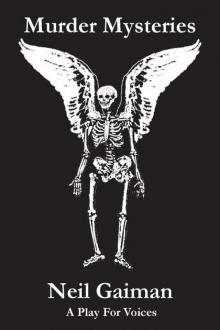 Murder Mysteries
Murder Mysteries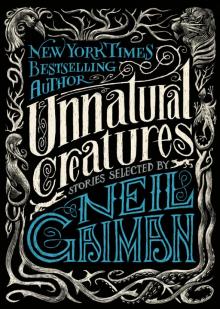 Unnatural Creatures
Unnatural Creatures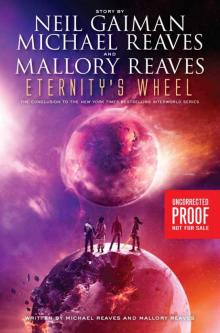 Eternity's Wheel
Eternity's Wheel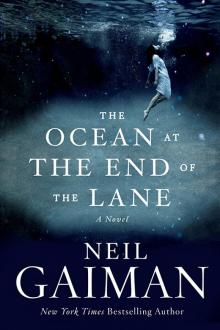 The Ocean at the End of the Lane
The Ocean at the End of the Lane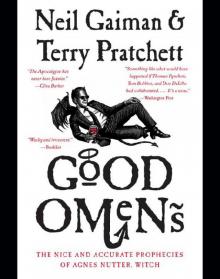 Good Omens
Good Omens Stardust
Stardust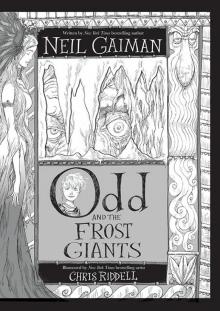 Odd and the Frost Giants
Odd and the Frost Giants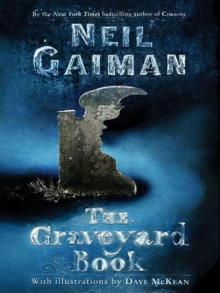 The Graveyard Book
The Graveyard Book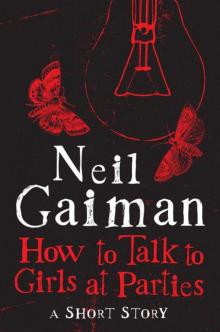 How to Talk to Girls at Parties
How to Talk to Girls at Parties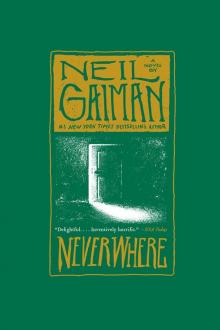 Neverwhere
Neverwhere Snow, Glass, Apples
Snow, Glass, Apples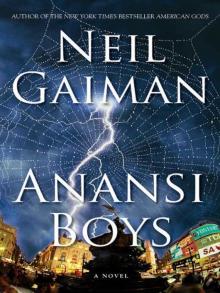 Anansi Boys
Anansi Boys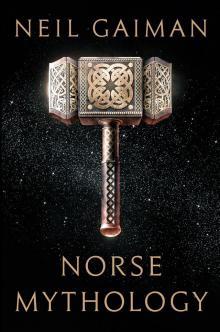 Norse Mythology
Norse Mythology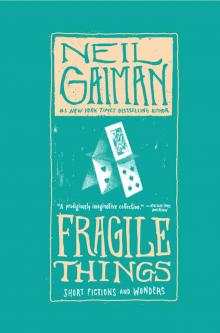 Fragile Things: Short Fictions and Wonders
Fragile Things: Short Fictions and Wonders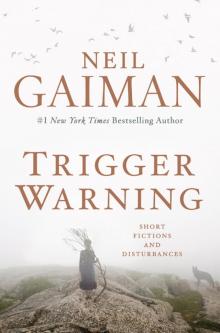 Trigger Warning: Short Fictions and Disturbances
Trigger Warning: Short Fictions and Disturbances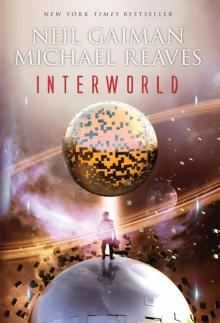 InterWorld
InterWorld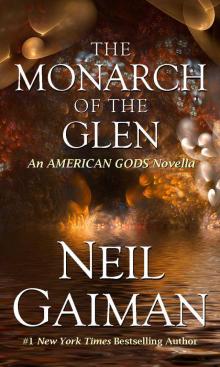 The Monarch of the Glen
The Monarch of the Glen The Neil Gaiman Reader
The Neil Gaiman Reader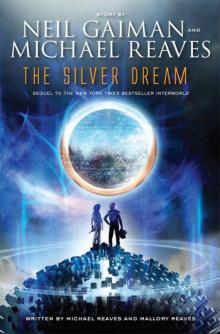 The Silver Dream
The Silver Dream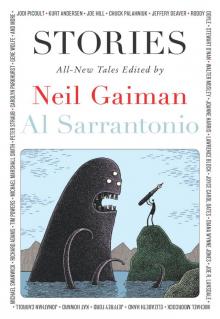 Stories
Stories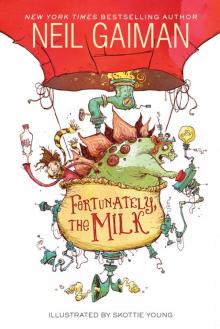 Fortunately, the Milk
Fortunately, the Milk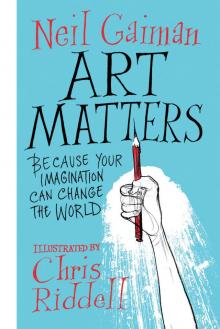 Art Matters
Art Matters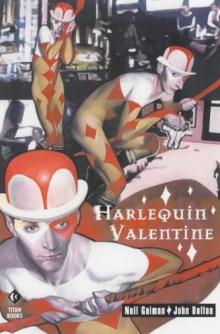 Harlequin Valentine
Harlequin Valentine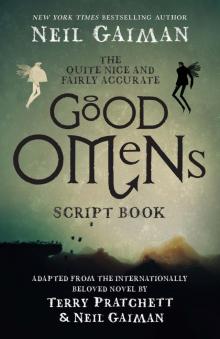 The Quite Nice and Fairly Accurate Good Omens Script Book
The Quite Nice and Fairly Accurate Good Omens Script Book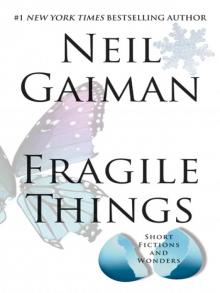 Fragile Things
Fragile Things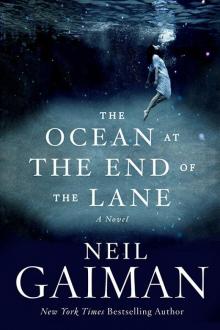 The Ocean at the End of the Lane: A Novel
The Ocean at the End of the Lane: A Novel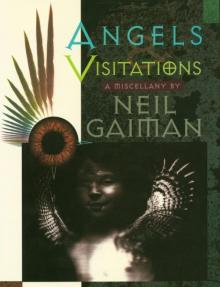 Angels and Visitations
Angels and Visitations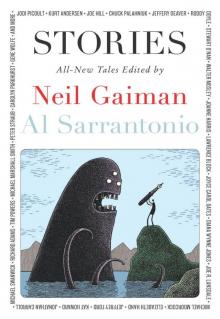 Stories: All-New Tales ngss-1
Stories: All-New Tales ngss-1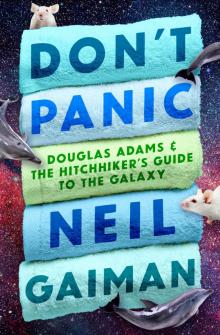 Don't Panic
Don't Panic Darker Terrors
Darker Terrors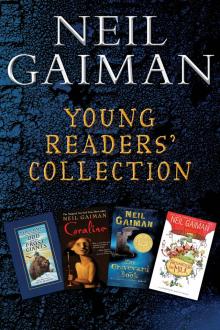 Neil Gaiman Young Readers' Collection
Neil Gaiman Young Readers' Collection A Study In Emerald
A Study In Emerald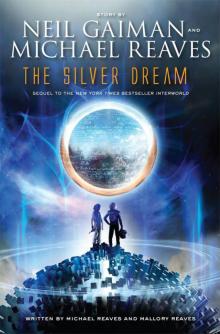 The Silver Dream: An InterWorld Novel
The Silver Dream: An InterWorld Novel Feeders and Eaters
Feeders and Eaters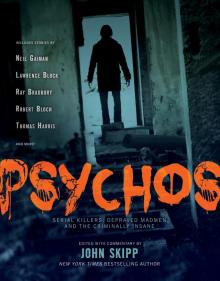 Psychos
Psychos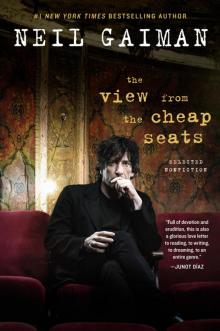 The View from the Cheap Seats
The View from the Cheap Seats Trigger Warning
Trigger Warning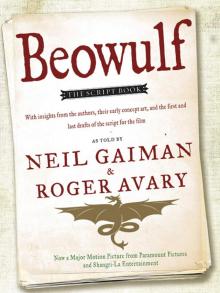 Beowulf
Beowulf Nessun Dove
Nessun Dove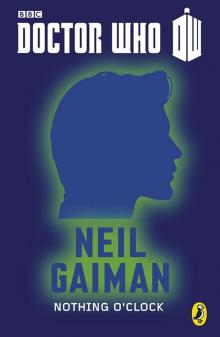 Doctor Who: Nothing O'Clock: Eleventh Doctor: 50th Anniversary
Doctor Who: Nothing O'Clock: Eleventh Doctor: 50th Anniversary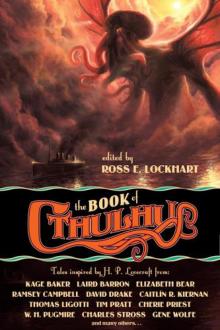 The Book of Cthulhu
The Book of Cthulhu